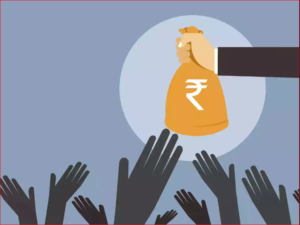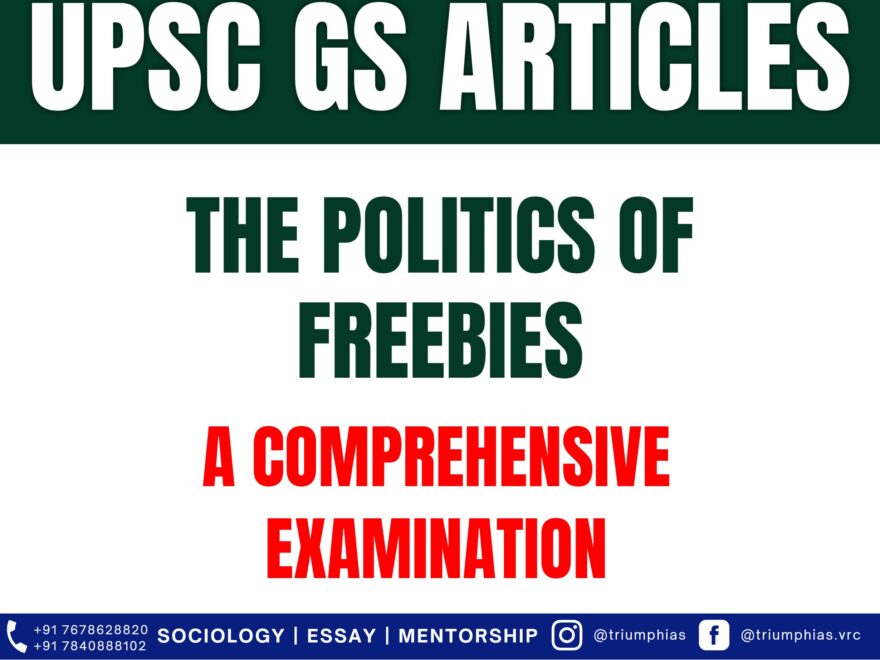POLITICS OF FREEBIES
(Relevant for General Studies paper Prelims/mains)

During each election season, it is widely recognized that political parties from all backgrounds make ambitious spending pledges in their quest for electoral victory.
In their pursuit of electoral triumph, political parties often offer a range of freebies such as electricity, water, and transportation. Among these promises, the commitment to provide free electricity has gained significant popularity.
However, the provision of extensive electricity subsidies not only poses a threat to a state’s fiscal stability but also comes with significant opportunity costs. These costs limit the availability of funds for social programs in other crucial areas.
As an illustration, Karnataka’s budget allocations for education and healthcare fall below the average allocations in these sectors compared to other states.
Freebie
According to a report by the Reserve Bank of India in 2022, freebies are described as “public welfare measures that are provided at no cost.” The report distinguishes freebies from public or merit goods, such as healthcare and education, which entail expenditure but offer broader and long-lasting benefits.
Differentiating between freebies and welfare schemes can sometimes be challenging, but a broad distinction lies in their long-term effects on beneficiaries and society. Welfare schemes are designed to have a positive impact, whereas freebies can lead to dependency or distortions.
Freebies refer to goods and services provided to users without any cost or charge. Their primary objective is to benefit the targeted population in the short run. Freebies are often employed as a strategy to attract voters or entice them through populist pledges. Examples of freebies include free laptops, televisions, bicycles, electricity, water, and more.
Regenerate response
On the contrary, welfare schemes are meticulously designed initiatives that seek to enhance the well-being of the intended population and enhance their quality of life while ensuring access to essential resources. These schemes primarily aim to fulfill the constitutional responsibilities outlined in the Directive Principles of State Policy. They are widely regarded as mechanisms to promote social justice, equity, and human development. Illustrative instances of welfare schemes include the public distribution system (PDS), the Mahatma Gandhi National Rural Employment Guarantee Act (MGNREGA), the mid-day meal scheme, and more.

Advantages of Freebies
- Public Outreach and Engagement: Government initiatives that provide freebies can enhance public trust and satisfaction in the government, serving as evidence of its commitment to respond to and be accountable to the citizens.
- Additionally, freebies can create avenues for feedback and dialogue between the government and the public, thereby promoting transparency and democracy.
- According to a study conducted by the Centre for Policy Research, the distribution of freebies such as laptops, bicycles, and cash transfers yielded favorable outcomes in terms of increased voter turnout, heightened political awareness, and enhanced satisfaction with the government in the states of Uttar Pradesh and Tamil Nadu.
- Freebies have the potential to foster economic growth by enhancing the productive capacity of the workforce, particularly in less developed regions. For instance, the provision of freebies like laptops, bicycles, or sewing machines can improve the skills, mobility, and income prospects of individuals from impoverished rural areas.
- According to a study conducted by the World Bank, freebies such as food subsidies offered through the Public Distribution System (PDS) resulted in a 7% reduction in the poverty ratio in India during the year 2011-12.
- Additionally, a survey conducted by the National Sample Survey Office (NSSO) indicated that freebies such as health insurance provided through the Rashtriya Swasthya Bima Yojana (RSBY) reduced out-of-pocket healthcare expenses and protected below poverty line households from catastrophic health-related financial burdens.
- Moreover, freebies can contribute to the reduction of income inequality and poverty by promoting a more equitable distribution of wealth and resources.
- For instance, initiatives such as loan waivers or cash transfers can empower debt-ridden or low-income households by granting them access to assets, credit, or income support.
- The provision of freebies has the potential to foster a detrimental cycle of dependency and entitlement among recipients, leading to an expectation of further freebies in the future and a decrease in motivation to work hard or contribute through taxes.
- Moreover, freebies can have adverse ramifications on the fiscal stability and overall macroeconomic health of a state or country. This is primarily due to the increased public expenditure, subsidies, deficits, debts, and inflation associated with such initiatives.
- Furthermore, freebies can distort the allocation of resources and expenditure priorities, diverting funds away from more vital and productive sectors like infrastructure, agriculture, and industry.
- Additionally, freebies can have a negative impact on the environment.
- This is evident through the encouragement of excessive use and wastage of natural resources such as water, electricity, and fuel, thereby exacerbating environmental concerns.
The primary focus should be on tackling the underlying factors of poverty, inequality, and exclusion that render individuals susceptible to the allure of freebies. By prioritizing inclusive development, a more favorable setting for economic growth and societal advancement can be fostered, ultimately benefiting all segments of the population over the long term. Consequently, inclusive development presents itself as a more efficacious and preferable alternative to the provision of freebies.
To master these intricacies and fare well in the Sociology Optional Syllabus, aspiring sociologists might benefit from guidance by the Best Sociology Optional Teacher and participation in the Best Sociology Optional Coaching. These avenues provide comprehensive assistance, ensuring a solid understanding of sociology’s diverse methodologies and techniques.
Politics of Freebies, Election Freebies, Freebies vs Welfare Schemes, Advantages of Freebies, Disadvantages of Freebies, Freebies in Politics, Public Outreach, Economic Growth, Fiscal Stability, Inclusive Development, Best Sociology Optional Teacher, Best Sociology Optional Coaching, Sociology Optional Syllabus.
Follow us :
🔎 https://www.instagram.com/triumphias
🔎https://www.youtube.com/c/TriumphIAS
https://t.me/VikashRanjanSociology
Find More Blogs
|
Scope of the subject and comparison with other social sciences |
|||
|
|
|
|
Modernity and social changes in Europe |

